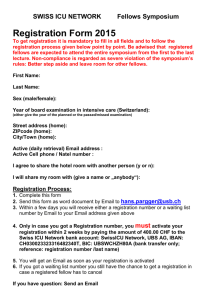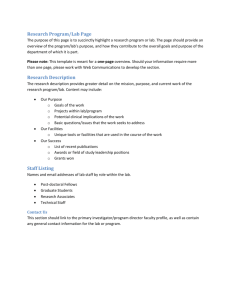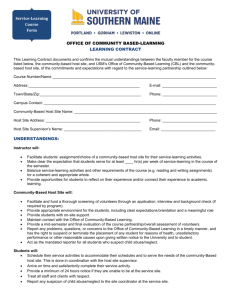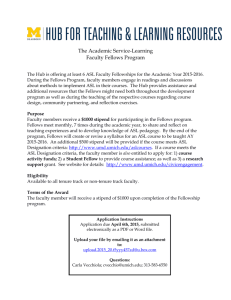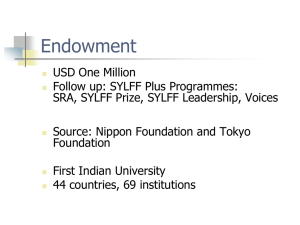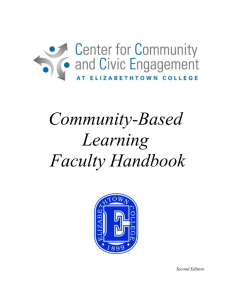2014-15 Initiative for Community-Based Learning and Research
advertisement
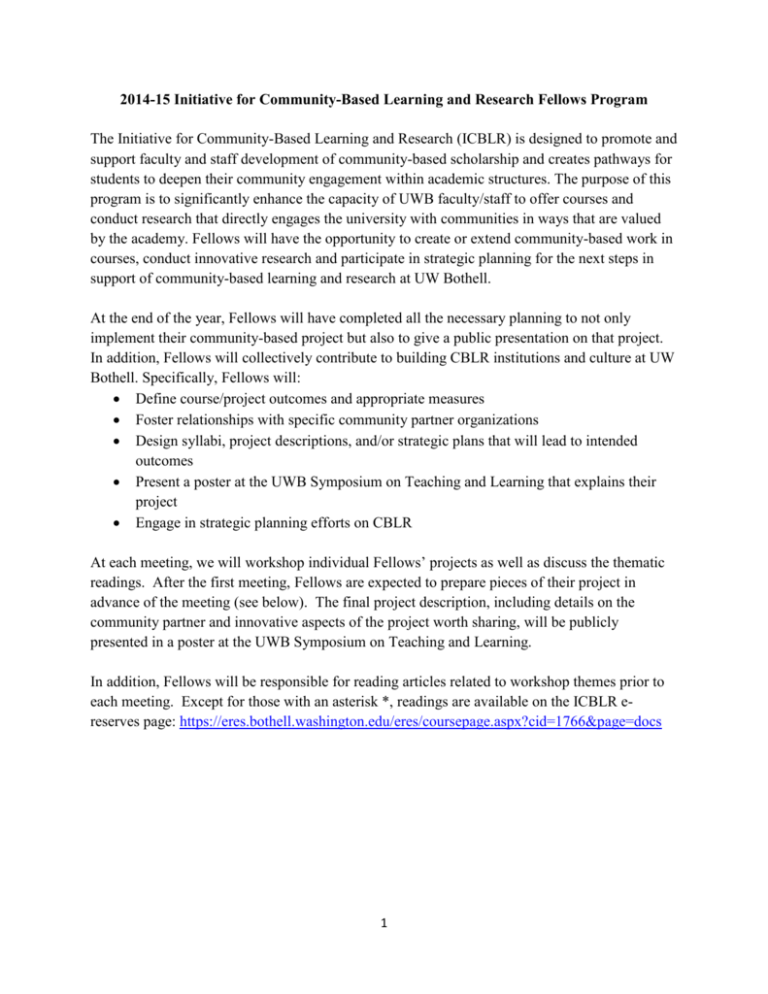
2014-15 Initiative for Community-Based Learning and Research Fellows Program The Initiative for Community-Based Learning and Research (ICBLR) is designed to promote and support faculty and staff development of community-based scholarship and creates pathways for students to deepen their community engagement within academic structures. The purpose of this program is to significantly enhance the capacity of UWB faculty/staff to offer courses and conduct research that directly engages the university with communities in ways that are valued by the academy. Fellows will have the opportunity to create or extend community-based work in courses, conduct innovative research and participate in strategic planning for the next steps in support of community-based learning and research at UW Bothell. At the end of the year, Fellows will have completed all the necessary planning to not only implement their community-based project but also to give a public presentation on that project. In addition, Fellows will collectively contribute to building CBLR institutions and culture at UW Bothell. Specifically, Fellows will: Define course/project outcomes and appropriate measures Foster relationships with specific community partner organizations Design syllabi, project descriptions, and/or strategic plans that will lead to intended outcomes Present a poster at the UWB Symposium on Teaching and Learning that explains their project Engage in strategic planning efforts on CBLR At each meeting, we will workshop individual Fellows’ projects as well as discuss the thematic readings. After the first meeting, Fellows are expected to prepare pieces of their project in advance of the meeting (see below). The final project description, including details on the community partner and innovative aspects of the project worth sharing, will be publicly presented in a poster at the UWB Symposium on Teaching and Learning. In addition, Fellows will be responsible for reading articles related to workshop themes prior to each meeting. Except for those with an asterisk *, readings are available on the ICBLR ereserves page: https://eres.bothell.washington.edu/eres/coursepage.aspx?cid=1766&page=docs 1 Meetings Overview Oct. 31st, 2014: Introductions & Community-Based Learning Theory (12:00- 4:00pm) Lead facilitators: Lauren Lichty & Bryan White During our first meeting, Fellows will have an opportunity to introduce their project, and hear from a variety of CBLR practitioners about different models. Read in preparation: Israel, B., Schulz, A., Parker, E., Becker, A. (1998) Review of community-based research: assessing partnerships approaches to improve public health. Annual Review of Public Health, 19, 173-202. Campus Compact (2003). Section 1: Service Learning Definitions and Principles Introduction to Service-Learning Toolkit: Readings and Resources for Faculty (2nd edition), p. 6-14. Butin, D. (2003). Of What Use is it? Multiple Conceptualizations of Service Learning within Education. Teachers College Record Volume 105, #9, p. 1674-1692. Homework: Description of the intended outcomes of your project (e.g. students, faculty, program, partner organization, research, etc.) Nov. 7th , 2014: CBLR Project Outcomes (10am-12pm) Lead facilitator: Jin-Kyu Jung Read: Cantor, Nancy. 2007. “Scholarship in Action and the Public Mission of Universities.” Speech given at Baylor University, December 7, 2010, as part of the Presidential Inaugural Lecture Series. Stoecker, Randy. 2009. Are we talking the walk of community-based research?. Action Research. Vol 7(4). Optional: Review the statement on promotion and tenure for your academic school. Eatman, T., Weber, S., Nastassi, W., and Bush, A. (2011). Profiles and Pathways: A Mixed Methods Study of the Aspirations and Career Decisions, Handout for American Educational Research Association National Conference (p. 4-10). Designing Effective Service-Learning Courses Dec. 5th , 2014: Practicing CBLR (10am-12pm) Lead facilitator: Amoshaun Toft Prepare: Identify and describe your (potential) community partners 2 Read: Bringle, R.G., Clayton, P.H., and Price, M.F. (2009). Partnerships in Service Learning and Civic Engagement. Partnerships: A Journal of Service-Learning & Civic Engagement, Summer 2009. Community-Campus Partnerships for Health- Principles of Good Community-Campus partnerships Strier, R. (2011). The construction of university-community partnerships- entangled perspectives. Higher Education, 62, 81-97. Optional: Stoecker, R. & Tryon, E. (2009). The community standards for service learning. In R. Stoecker and E. Tryon. The unheard voices: Community organizations and service learning. pp. 163-186. Philadelphia, PA: Temple University Press. Osman, R. & Attwood, G. (2009). Power and participation in and through servicelearning. Education as Change, 11(3), 15-21. Cruz, N. & Giles, D. (2000). Where’s the community in service-learning research. Michigan Journal of Community Service Learning, 28-34. Feb. 6th , 2015: CBLR Design (10am-12pm) Lead facilitator: Rob Turner Prepare: Description of how you will achieve your course/project outcomes Read: *Howard, J (2001). Serving Learning Course Design Workbook. Michigan Journal of Community Service Learning, Summer 2001. Stoecker, Randy. “The Goose Approach to Research.” Chapter 2 in Research Methods for Community Change. London; Thousands Oaks, CA: SAGE, 2005. 27-58. Optional Reading: Fenstermacher, B. (2201). Chapter 2: Implementation. In K. Heffernan (Ed.), Fundamentals of Service-Learning Course Construction (pp. 9-78). Campus Compact. Heffernan, Kerrissa and Cone, Richard. (2003). Course Organization. Introduction to Service-Learning Toolkit: readings and resources for faculty. (pp. 105-110). Brown University. April ? , 2015: Symposium on Teaching and Learning (2 hours) Fellows present a poster at the UWB Symposium for Teaching and Learning describing their CBLR projects April 30th: Fellows stipend spending deadline! All spending needs to be approved and receipts turned in by April 30th. 3 May 1st 2015: Debrief and Fostering a Community of Support for CBLR at UWB Debrief on CBLR project; development, implementation, future Questions remaining Prepare for meeting with Vice Chancellor for Academic Affairs, Susan Jeffords and/or Chancellor Wolf Yeigh Read: Weerts, David J. and Lorilee R. Sandmann. (2008). "Building a Two-Way Street: Challenges and Opportunities for Community Engagement at Research Universities." The Review of Higher Education, 32(1), 73-106. Maurrasse, David J. "The Mission of Higher Education." Beyond the Campus: How Colleges and Universities Form Partnerships with Their Communities. New York: Routledge, 2001. 11-28. Moore, T., & Ward, K. (2010). Institutionalizing Faculty Engagement Through Research, Teaching, and Service at Research Universities. Michigan Journal of Community Service Learning, 17(1), 44-58. Optional: Morton, Keith (1995). "The Irony of Service: Charity, Project, and Social Change in Service-Learning." Michigan Journal of Community Service Learning, 2, 19-32. Tilley-Lubbs, G.A. (2009). Good intentions pave the way to hierarchy: A retrospective autoethnographic approach. Michigan Journal of Community Service Learning, 59-68. Joseph, Miranda. "Introduction." Against the Romance of Community. Minneapolis: University of Minnesota Press, 2002. vii-xix, 79-181. May 4th-8th, 2015: Round table with Susan Jeffords/Wolf Yeigh Institutionalizing CBLR at UWB Where are structural barriers? Challenges and opportunities at UWB? May 27th, 2015: CBLR Recognition and Celebration for Faculty, Students, and Community Partners 4



